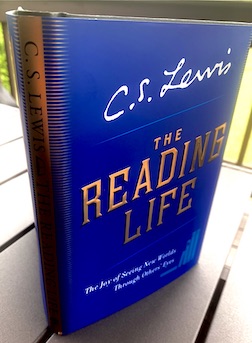Today I again visit my back deck in the breeze of a September afternoon, with a drink and a book. Today I have brought along a couple books; C. S. Lewis’s The Reading Life and Rainer Maria Rilke’s Duino Elegies. I have also brought along a couple papers offering some critical analysis of Rilke’s work to bolster my learning. I have briefly adjourned my reading to take the opportunity to write some thoughts related to this afternoon activity.
In my previous blog post, Read Me Once Read Me Twice, I referred to Lewis’ identifying a love for re-reading a book as one trait of a “true reader”. A second trait he attributes to a true reader is highly valuing reading as an activity; I suggest even to the point of a daily activity. By defining reading as an activity, he is contrasting with the individual who approaches reading “as a last resort”. Those readers occupying this space of relegating reading to something one does “as a last resort”, I suggest, clearly engages a “book” mainly to fill time rather than filling oneself.
A few years ago, I decided to add reading to my daily “routines” to see just what I would experience beyond my previous four decades of reading to advance a career and my success; a rather inward goal with very local benefit beyond myself. Within the first couple classics I spent time with I could already sense change; positive change that reinforced a positive feedback loop that persisted into the formation of a very intentional, and daily activity.
The first change I noticed was a strengthening of mental cognition. You mean it made you smarter? No, that is not what I am referring too. What I began experiencing was more mental awareness in my interactions with my environment. I found myself listening closer, considering broader perspectives of events, and what I call “sitting in the gray areas of life” more. By that I mean I was no longer immediately seeing things as “black” or “white”, but through an active awareness I considered things at more than just a surface level. However, do not panic! I did not abandon my views of “right” and “wrong” (which some seem overly concerned if one does not past judgment immediately), I just allowed myself to be more thoughtful, prayerful, and thus slower to declare any judgment, if any. But this is a much more complicated discussion that I desire to commit this writing too. I just want to suggest that reading provides benefit to our mental cognition much in the same manner as exercise provide health benefits; and there are those science publications to back that pronouncement.
The second change I noticed, I believe, is truly a continuation of the effect of the first change I mentioned. My daughters and I have often discussed how reading tends to provide the opportunity for one to develop a more “active” empathy beyond what our normal daily interactions can sometimes provide. When setting aside time to intentionally engage with a book, within an intentional periodicity, I commit myself to be impacted by the activity just as I do when I schedule physical activity and exercise into my daily routine.
I agree with Lewis on his views of the positive impact becoming a true reader will produce in my life; has produced in my life. I encourage others to pursue reading in their life. Also, understand that your pursuit may not look like mine…. and it shouldn’t. What you read and how you engage with your reading choices is your personal preference. However, I believe the benefits will be found very similar.
